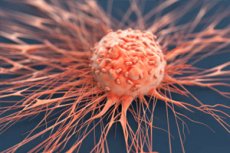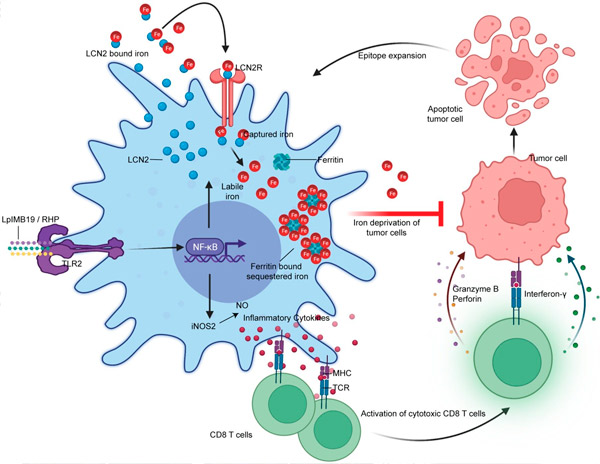New publications
Scientists make advances in cancer microbiome therapy through iron deprivation of the tumor microenvironment
Last reviewed: 02.07.2025

All iLive content is medically reviewed or fact checked to ensure as much factual accuracy as possible.
We have strict sourcing guidelines and only link to reputable media sites, academic research institutions and, whenever possible, medically peer reviewed studies. Note that the numbers in parentheses ([1], [2], etc.) are clickable links to these studies.
If you feel that any of our content is inaccurate, out-of-date, or otherwise questionable, please select it and press Ctrl + Enter.

A team from POSTECH and ImmunoBiome has made a potential breakthrough in the fight against cancer. Their study, published in the May issue of Nature Immunology, examines a strain of bacteria called IMB001, derived from dietary sources. This strain induces “nutrient immunity” to enhance anti-tumor responses. The discovery sheds light on how microbial therapies work and opens the door to their use in clinical practice.
The research, led by Dr. Shin-Heog Im, a professor at Pohang University of Science and Technology (POSTECH) and founder and CEO of ImmunoBiome, developed a new strategy to identify beneficial bacteria suitable for cancer treatment. They also elucidated the mechanism by which these bacteria trigger specific immune responses in the body.
They are currently submitting applications for clinical trials of new drugs and plan to begin clinical trials in 2025. IMB001 could be used as a combination therapy along with existing checkpoint inhibitors.
IMB001 is a unique single-strain live biotherapeutic product (LBP) classified as Lactobacillus plantarum IMB19 (LpIMB19). It has shown impressive results in preclinical studies of various cancers. In animal models, IMB001 delayed tumor progression in melanoma, renal cell carcinoma, breast cancer, and experimental metastases.
In addition, it enhances the efficacy of checkpoint inhibitor (anti-PDL1) therapy. The research team also isolated an effector molecule, rhamnose-rich capsular polysaccharide (RHP), from IMB001 bacteria. This molecule has shown promising results in animal models. These advances pave the way for a new generation of highly effective and potentially more affordable microbial cancer therapies.
Thus, IMB001 also offers a viable option as a combination therapy with conventional cancer treatments. IMB001’s mechanism of action involves inducing tumor-infiltrating macrophages to an inflammatory phenotype. These activated macrophages then activate the adaptive immune system by increasing the infiltration and activation of IFNγ+CD8+ T cells.
On the other hand, these inflammatory macrophages use a high-affinity iron transporter called lipocalin 2 (LCN2) to deprive tumor cells of iron by capturing and retaining it from the environment. Deprivation of this essential trace element of iron leads to increased death of rapidly dividing tumor cells, potentially leading to epitope expansion (increased number of targets for the immune system) and overall suppression of tumor growth.

Model of LpIMB19/RHP-induced anti-cancer immune response. Source: Nature Immunology (2024). DOI: 10.1038/s41590-024-01816-x
Professor Im highlighted the significance of this study, stating that it represents a significant step forward for the company and solidifies their position as a leader in the field of LBPs. He expressed excitement about advancing IMB001, discovered through Avatiome, into clinical development. He also emphasized the importance of understanding how LBPs interact with the immune system to generate potent anti-tumor responses.
This opens the way to a multifactorial approach to cancer treatment. Professor Im noted that current microbial therapies have often been selected based on their effects rather than the underlying mechanisms. ImmunoBiome has successfully identified and validated the mechanism of IMB001 to enhance antitumor immunity in tumors.
ImmunoBiome is a leader in the development of live biotherapeutic products (LBPs) to combat current incurable diseases such as cancer and autoimmune diseases. Their expertise lies in the discovery, identification and development of live bacterial and drug-derived therapies.
Using its proprietary Avatiome platform, the company rationally selects pharmacologically active bacterial strains and understands mechanisms of action in a variety of disease conditions. They collaborate with leading researchers worldwide to identify, isolate, purify, and chemically characterize immunologically active molecules from bacteria. ImmunoBiome has built its own database of human commensal bacterial strains isolated from a variety of mucosal surfaces.
In addition, they are at the forefront of developing predictive strategies that link biomarkers to disease prognosis using large datasets from human clinical trials.
